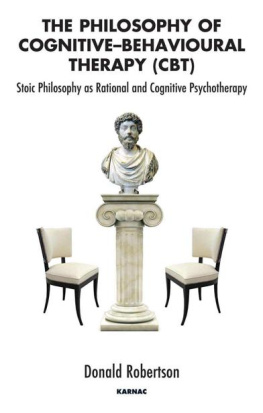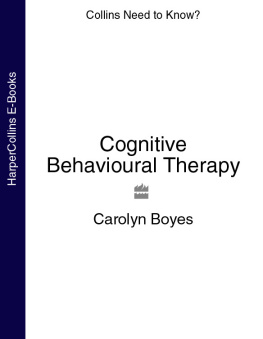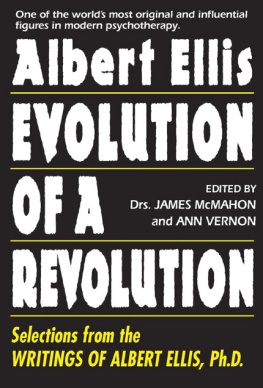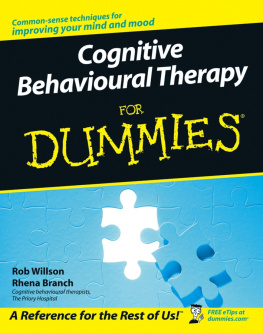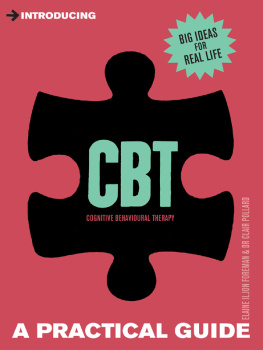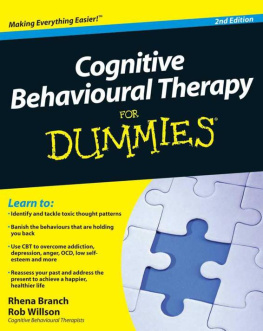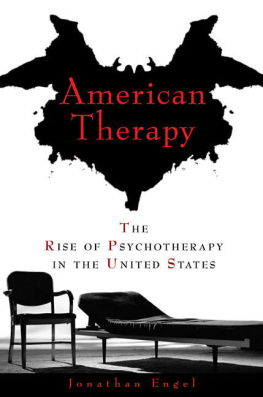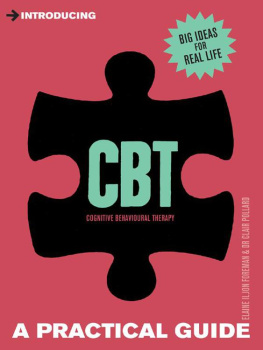The Philosophy of Cognitive-Behavioural Therapy (CBT)
This exciting new edition of The Philosophy of Cognitive-Behavioural Therapy (CBT) demonstrates how techniques and concepts from Socratic philosophy, especially Stoicism, can be integrated into the practise of CBT and other forms of psychotherapy. What can we learn about psychological therapy from ancient philosophers? Psychotherapy and philosophy were not always separate disciplines. Here, Donald Robertson explores the relationship between ancient Greek philosophy and modern cognitive-behavioural psychotherapy.
The founders of CBT described Stoicism as providing the philosophical origins of their approach and many parallels can be found between Stoicism and CBT, in terms of both theory and practise. Starting with hypnotism and early twentieth century rational psychotherapy and continuing through early behaviour therapy, rational-emotive behaviour therapy (REBT), and cognitive-behavioural therapy (CBT), the links between Stoic philosophy and modern psychotherapy are identified and explained. This book is the first detailed account of the influence of Stoic philosophy upon modern psychotherapy. It provides a fascinating insight into the revival of interest in ancient Western philosophy as a guide to modern living. It includes many concepts and techniques, which can be readily applied in modern psychotherapy or self-help.
This new edition, covering the growth in third-wave CBT, including mindfulness and acceptance-based therapies, will appeal to any mental health practitioner working in this area, as well as students and scholars of these fields.
Donald Robertson is a cognitive-behavioural psychotherapist, writer, and trainer. He specializes in the treatment of anxiety and in the relationship between ancient philosophy and modern psychotherapy. He is the author of six books on philosophy and psychotherapy, including The Practice of Cognitive-Behavioural Hypnotherapy: A Manual for Evidence-Based Clinical Hypnosis (2013).
Praise for the First Edition:
Robertson rightly reminds us of how much CBT owes its philosophical origins to the Stoics but, sadly, how often this debt is insufficiently acknowledged. He urges us to redirect our attention to the past to see how modern CBT still has much to learn from its ancient precursors. Highly recommended.
Michael Neenan, Co-Director of the CBT Programme, Centre for Stress Management, Bromley, Kent, UK
Many of us have felt the need for a book that covers the underlying philosophy of the cognitive-behavioural therapies in much greater depth. This book is a fascinating read and could be considered as either a prequel or a sequel to the standard textbook read by a trainee or experienced cognitive-behavioural or rational emotive practitioner who wants to understand these approaches to therapy within an historical framework.
Professor Stephen Palmer, PhD, FARBT, FBACP, Director of the Centre for Stress Management, London, UK
The author has uncovered a wealth of connections between modern cognitive-behavioural therapies and ancient Stoic philosophy. It should be read by anyone interested in understanding the historical roots of CBT or in learning about how ancient psychotherapeutic methods can add to the modern therapists toolkit.
Tim LeBon, UKCP registered psychotherapist and author of Wise Therapy
The Philosophy of Cognitive-Behavioural Therapy (CBT)
Stoic Philosophy as Rational and Cognitive Psychotherapy
Second Edition
Donald Robertson

Second edition published 2020
by Routledge
2 Park Square, Milton Park, Abingdon, Oxon, OX14 4RN
and by Routledge
52 Vanderbilt Avenue, New York, NY 10017
Routledge is an imprint of the Taylor & Francis Group, an informa business
2020 Donald Robertson
The right of Donald Robertson to be identified as author of this work has been asserted by him in accordance with sections 77 and 78 of the Copyright, Designs and Patents Act 1988.
All rights reserved. No part of this book may be reprinted or reproduced or utilised in any form or by any electronic, mechanical, or other means, now known or hereafter invented, including photocopying and recording, or in any information storage or retrieval system, without permission in writing from the publishers.
Trademark notice: Product or corporate names may be trademarks or registered trademarks, and are used only for identification and explanation without intent to infringe.
First edition published by Routledge 2010
British Library Cataloguing-in-Publication Data
A catalogue record for this book is available from the British Library
Library of Congress Cataloging-in-Publication Data
A catalog record for this book has been requested
ISBN: 978-0-367-21987-1 (hbk)
ISBN: 978-0-367-21914-7 (pbk)
ISBN: 978-0-429-26870-0 (ebk)
Typeset in Times New Roman
by Apex CoVantage, LLC
Contents
Professor Stephen Palmer
PART I
Philosophy and cognitive-behavioural therapy
PART II
The Stoic armamentarium
All quotations from Epictetus Discourses, Handbook, and Fragments are taken from Robin Hards translation unless otherwise specified (Epictetus, trans. 1995). All quotations from Marcus Aurelius The Meditations are taken from Robin Hards translation unless otherwise specified (Marcus Aurelius, trans. 2011). Quotations from Plato are taken from John M. Coopers edited Complete Works (Plato, trans. 1997). Where necessary, certain translations have been quoted from other sources or modified, as indicated in the text.
Cognitive-behavioural therapies are at the cutting edge of modern psychological therapeutic interventions. They are evidence based and, therefore, are underpinned by much research. In the United Kingdom (UK), the National Institute for Health and Clinical Excellence (NICE) has recommended cognitive-behavioural therapy for depression and anxiety-related disorders such as panic attacks, obsessive-compulsive behaviour, body dysmorphic disorder, and post-traumatic stress disorder (e.g., NICE, 2004, 2005, 2006, 2009). It is no surprise that this interests stakeholders wishing to provide cost-effective psychological therapies to their customers, that is, the public, in order to improve well-being and reduce financial expenditure. In the UK, the government has taken the next logical step and funded cognitive-behavioural therapy training as part of the Improving Access to Psychological Therapies (IAPT) programme. Stressed, depressed, and anxious citizens cost countries billions of pounds, according to the research data, and, understandably, reducing absenteeism from work due to psychological illness is an attractive target to focus on. An effective IAPT programme can benefit both the country and the individual.
Cognitive-behavioural therapy has become one of the main approaches for dealing effectively with a wide range of psychological disorders, and this has led to a large increase in the training of health professionals in this approach, especially within the UK. Key handbooks available to trainees, based on Dr Aaron Temkin Becks cognitive therapy (Beck, 1976) or Dr Albert Ellis rational emotive behaviour therapy (REBT) (Ellis, 1958), only briefly, if at all, cover the historical roots of these therapies. Ellis, in his publications, is often more explicit about the early origins of REBT in comparison to the books on cognitive and cognitive-behavioural therapy.


